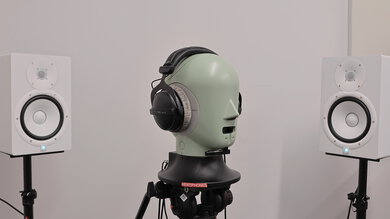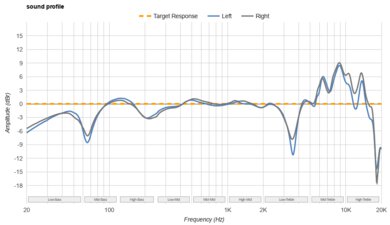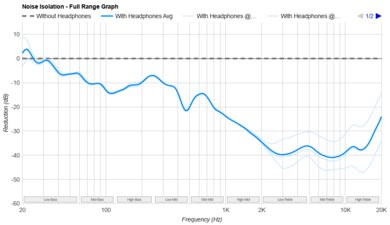
Whether you're new to podcasts or a seasoned veteran, a good pair of headphones can make all the difference when recording or editing your next episode. Headphones allow you to monitor your audio during live sessions and hear tracks like your audience. They should have a comfortable fit that won't become fatiguing over long periods of use. They should also block out ambient noise and have a balanced sound profile that ensures clear and accurate dialogue reproduction.
Since many creators use a standalone mic to ensure a higher recording quality, we've mainly focused on headphones without a built-in mic. We also prioritize wired picks on this list, as a wireless Bluetooth connection can introduce additional latency that can interfere with live monitoring.
We've tested over 820 pairs of headphones, and below, you'll find our recommendations for the best podcast headphones to buy. Also, check out our picks for the best studio headphones for mixing and recording, the best DJ headphones, and the best audiophile headphones.
-
Best Headphones For Podcasting
Neutral Sound7.9Type Over-earEnclosure Closed-BackWireless NoTransducer DynamicNoise Cancelling NoMic NoThe Beyerdynamic DT 1770 PRO are the best headphones for podcasting we've tested. If you only need a couple of pairs for your recording studio, these are a great choice due to their high-end design and build quality. These headphones also come with nice-to-haves like an extra set of ear cup pads in a leatherette finish, an extra coiled cable, and a hard case for storage. The cups are spacious and comfortable enough for long recording sessions, and they can passively cut down mid-range sounds like ventilation systems. However, they leak at higher volumes, which can impact your recordings. These headphones also have a high 250-ohm impedance, so you'll need to invest in an amp to drive them if you don't already own one.
These over-ears have a well-balanced sound profile, ensuring voices sound clear and natural. Although the upper harmonics of vocals and instruments sound slightly veiled due to a dip in the treble range, sibilants like S and T sounds are bright without being piercing. Their passive soundstage isn't very natural, though, which is normal from closed-back headphones, and they're prone to inconsistencies in audio delivery, so it's important to take the time to adjust their fit to ensure a consistent sound. For more consistent audio delivery, consider the Beyerdynamic DT 700 PRO X. These have a frequency response similar to our pick. However, they're slightly less accurate in the treble region and come with fewer accessories.
-
Best Upper Mid-Range Podcast Headphones
Neutral Sound7.7Type Over-earEnclosure Closed-BackWireless NoTransducer DynamicNoise Cancelling NoMic NoIf you have many hosts on your podcast or want something less expensive, consider the Beyerdynamic DT 770 PRO. Even though they don't feel as well-built as the pricier Beyerdynamic DT 1770 PRO, they still have a wide passive soundstage and an analytical sound, ensuring clear and accurate speech. Sibilants like S and T sounds are piercing, but you still may prefer this sound signature as it highlights imperfections in your recordings.
If you get the 250-ohm pair, you'll want to consider adding on an amp to get the most out of these headphones, but you can also purchase them with a lower impedance of 32 or 80 ohms if you want to connect them directly to recording devices like a laptop. Unfortunately, they're prone to audio bleed at high volumes, which can leak into your recording. If that's an issue, you'll want to check out the Audio-Technica ATH-M50x instead. They bleed less audio at high volumes, and their treble response is flatter and less bright. However, their passive soundstage isn't as immersive.
-
Best Mid-Range Podcast Headphones
Neutral Sound7.9Type Over-earEnclosure Closed-BackWireless NoTransducer DynamicNoise Cancelling NoMic NoThe best mid-range headphones for recording that we've tested are the Sony MDR-7506. These over-ears don't passively block out ambient sound as effectively as the Beyerdynamic models, which might be an issue if you want to reduce distractions to focus on your recording. However, they leak less audio than the previous pick, which is important to reduce the risk of audio bleed ruining your take. Their well-balanced sound profile makes voices sound clear and detailed, with a bit of extra brightness that can help make imperfections in the track easier to spot.
A 1/8" to 1/4" adapter is included in the box, making it easy to connect them to your audio equipment, and their spiral cable design can help prevent tangles if you tend to move the mic around. They're decently comfortable, so a couple of hours of recording won't cause much fatigue, but they aren't as well-built as the pricier options listed here. They also aren't very well padded, and the plastic frame tends to creak when you put the headphones on, which can be annoying. If you want the reliability of removable cables or prefer more space and a bit more padding for your ears in the ear cups, consider the Audio-Technica ATH-M40x. That said, if you're mixing with your headphones, the Audio-Technica are less accurate in the bass range than the Sony.
-
Best Budget Podcast Headphones
Neutral Sound7.5Type Over-earEnclosure Closed-BackWireless NoTransducer DynamicNoise Cancelling NoMic NoIf you're looking for inexpensive podcast headphones, the Audio-Technica ATH-M20x are a good option. Their build quality is a step down from the previous pick since the metal reinforcing the frame is thinner, and the design feels plasticky overall. Still, they offer a flat mid-range response that ensures voices sound clear and detailed. They have a decently comfortable, fairly breathable fit for long recording sessions. While they leak more audio than the Sony MDR-7506, it still isn't much, so audio bleed isn't a huge issue.
If you're less concerned about audio bleed during recording and want better sound for mixing and editing, you may prefer the Superlux HD 681. These over-ears have a semi-open design, which helps them create a more immersive soundstage. They also have a brighter treble response, which can help you spot imperfections in tracks. However, their semi-open design leaks more audio, and their sound can be sharp.
-
Best In-Ear Monitors For Podcasts
Neutral Sound8.0Type In-earEnclosure Closed-BackWireless NoTransducer HybridNoise Cancelling NoMic NoIf you don't like the fit and feel of over-ear headphones, consider in-ear monitors (IEMs) like the TRUTHEAR HEXA. They're a lot lighter than over-ears without sacrificing fit or comfort. They can also block out more background noise than the similarly priced Beyerdynamic DT 1770 PRO. They also leak less audio at high volumes and are less prone to inconsistencies in audio delivery, so you'll get the same sound each time you use them. They come with a range of silicone and foam tips to suit all ear shapes, too.
Their sound profile follows our target curve very well, so you can expect solid thump, rumble, and boom from the bass, while vocals and instruments sound natural and clear. That said, one of the downsides of an in-ear design is that their passive soundstage will be less spacious, wide, and out of head than that of over-ears. Still, they have a well-built design, and their cables are swappable, which is great as the connectors are prone to damage if you don't baby them.
Notable Mentions
- AKG K361:
The AKG K361 are comfortable and decently well-built headphones. However, they're prone to more inconsistencies in audio delivery than the Sony MDR-7506, so you may need to adjust them on your head each time you wear them to get a more consistent sound.
See our review - TRUTHEAR x Crinacle ZERO: RED:
The TRUTHEAR x Crinacle ZERO: RED are a slightly more affordable alternative to the TRUTHEAR HEXA if you want IEMs. They're similarly comfortable to the HEXA, with a balanced sound, though they lack the HEXA's extremely detailed mid and treble ranges. They have decent passive noise isolation due to their in-ear fit, too, allowing you to focus on nailing your takes without distractions.
See our review - Razer Moray:
The Razer Moray are IEMs designed for streaming and game broadcasting. They can be a solid option if you care about ergonomics, as they have a more comfortable fit than the TRUTHEAR HEXA. However, they leak a bit more audio, which can bleed into your recordings.
See our review - Beyerdynamic DT 1770 PRO MKII:
The Beyerdynamic DT 1770 PRO MKII are the refreshed version of our top pick the Beyerdynamic DT 1770 PRO. The MKII have a lower impedance of 30-ohms, making them more widely compatible with devices. Beyerdynamic also advertises the MKII's sonic performance as similar to the original, but we haven't tested them yet.
Untested - Join the discussion
Recent Updates
-
We've added the AKG K361 and the Beyerdynamic DT 1770 PRO MKII to our Notable Mentions and updated the text throughout for accuracy.
-
We've updated this article to include the TRUTHEAR HEXA as out in-ear pick.
-
Aug 05, 2024 : We've updated this article to mention the Beyerdynamic DT 700 PRO X as an alternative to the Beyerdynamic DT 1770 Pro and the Audio-Technica ATH-M40x as an alternative to the Sony MDR-7506 section.
-
May 13, 2024 : We've replaced the TRUTHEAR x Crinacle ZERO with the TRUTHEAR x Crinacle ZERO: RED due to their more balanced overall sound profile. Otherwise, we've made only minor changes to the text, and our picks remain the same.
-
Mar 14, 2024 : We've checked our picks and made minor changes to the text of this article to ensure it's up-to-date. All our picks remain the same, but we've removed the out-of-stock MOONDROP Aria as a Notable Mention and replaced them with the TRUTHEAR x Crinacle ZERO.
All Reviews
Our recommendations above are what we think are currently the best headphones for podcasting to buy for most people in each price range. We factor in the price (cheaper headphones win over pricier ones if the difference isn't worth it), feedback from our visitors, and availability (no headphones that are difficult to find or almost out of stock everywhere).
If you would like to choose for yourself, here is the list of our reviews for headphones that are good for neutral sound. Be careful not to get caught up in the details. There are no perfect headphones. Personal taste, preference, and listening habits will matter more in your selection.
Comments
Best Podcast Headphones: Main Discussion
What do you think of our picks? Let us know below.
Looking for a personalized buying recommendation from the RTINGS.com experts? Insiders have direct access to buying advice on our insider forum.
Update: We haven’t tested any new Sony soundbars. However, the Sony HT-S200F is no longer widely available, so we’ve replaced it with the Sony HT-S400.
What do you think of these changes? Let us know




































































































